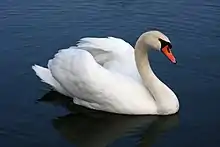géiss
Luxembourgish
Verb
géiss
- inflection of géissen:
- second-person singular present indicative
- second-person singular imperative
Old Irish

géiss
Alternative forms
Etymology
From Proto-Celtic *gansis, from Proto-Indo-European *ǵʰh₂éns (“goose”).
Pronunciation
- IPA(key): /ɡʲeːsʲ/
Noun
géiss f (nominative plural géissi)
- swan
- Glosses in Regina No. 215, 102b, published in Thesaurus Palaeohibernicus (reprinted 1987, Dublin Institute for Advanced Studies), edited and with translations by Whitley Stokes and John Strachan, vol. I, p. 2:
- géissi glosses coantes (in a gloss of Baruch 6:21(22), where the Vulgate actually has cattae (“cats”); it isn’t clear what Latin word the Irish glossator thought this was, but he glossed it as ‘swans’)
- Glosses in Regina No. 215, 102b, published in Thesaurus Palaeohibernicus (reprinted 1987, Dublin Institute for Advanced Studies), edited and with translations by Whitley Stokes and John Strachan, vol. I, p. 2:
Inflection
This noun needs an inflection-table template.
Mutation
| Old Irish mutation | ||
|---|---|---|
| Radical | Lenition | Nasalization |
| géiss | géiss pronounced with /ɣ(ʲ)-/ |
ngéiss |
| Note: Some of these forms may be hypothetical. Not every possible mutated form of every word actually occurs. | ||
References
- “1 géis” in Dictionary of the Irish Language, Royal Irish Academy, 1913–76.
This article is issued from Wiktionary. The text is licensed under Creative Commons - Attribution - Sharealike. Additional terms may apply for the media files.